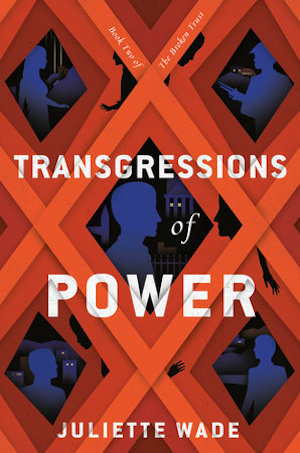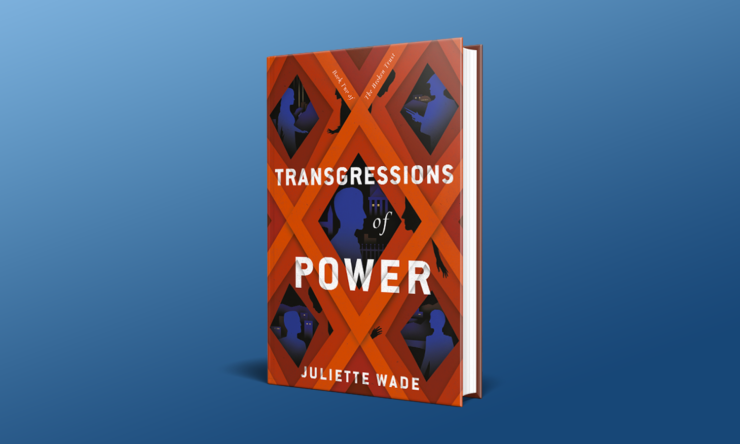In Juliette Wade’s Mazes of Power we were introduced to the Varin, an alternate world of humans on a planet whose surface is less than pleasant to be on for long periods of time, so high society, a decaying civilization, exists in underground cities. In Transgressions of Power, Wade continues the story of a society struggling with conflict and the potential to change.
Transgressions of Power takes place more than a decade after the events of the first book and most of the viewpoint characters are the upper class Grobal. Adon, Tamelera’s youngest son, is now thirteen, a propitious age for those who have read Mazes of Power. Tagaret is still working against his brother, the Heir Nekantor, as subtly and quietly as he can. His wife, Della, is a figure of tragedy, desperately trying to have a child that survives birth, the duty of any Grobal in this time of the Decline. Pyaras, meanwhile, is the very model of an upper class twit, with a taste for “muckwalking” and seeing the world of the Arissen, after the events of the first novel. The clueless Pyaras, though, is about to be thrust into the latest machinations of Nekantor, just as Adon and Tagaret are. And, on the surface, an Arissen named Melin is about to find out that getting involved with the Grobal is even more dangerous than the explosive Wysps she fights against.
Moving Nekantor, a viewpoint character in Mazes of Power, to a non-PoV status reduces our sympathy and understanding of him, especially as his machinations start to play out. On the other hand, it does make it even more clear than in the first book that Nekantor is indeed the antagonist of the Varin universe, and he is willing to do very bad things for his goals. I had sympathy for Nekantor in the first book—his neuro-atypical mindset in the first book gets a workout, and it does inform and influence his choices and outlook, but here, all of those clues and referents are exterior and not interior and are relatively subtle. Nekantor is not a four-color villain, and he lays out his goals and has a good reason for them, but he definitely has blinders on when it comes to what his plans would do to the Varin. In trying to engineer his own ascension and that of the Heir of his choice, Nekantor’s efforts to change the government by hook and crook feel awfully resonant with events, say, at the end of 2020.
Buy the Book


Transgressions of Power
Nekantor’s work is the central plot of Trangressions of Power, but the book really isn’t about him so much as it is, like the first book, about the introduction of characters and the major themes of how the Varin are going to tackle, or not tackle, the real societal problems that they face. The Decline of the Grobal is a central issue of the first and this second novel, the Grobal have a serious problem with the health of the ruling caste in this stratified caste society. A contagious disease endemic to the Grobal (and the inciting incident of the first book) is just a symptom of the problems the lead Families face. Problems of fertility and general health make the Grobal worse off. While someone might well think that the fall of the Grobal wouldn’t be a bad thing for the Imbati, Arissen and the rest of the castes of the Varin, Wade’s verse has a stricture of caste and caste boundaries more formal and constricting than most societies in human history. A revolution in the Varin world would have catastrophic effects and for all of the problems with the social pyramid, overthrow of the Grobal, or even just intermingling with them, is nearly incomprehensible and of course should Not Be Done.
And that brings us to another theme of the series, and this book in particular (right in the title, Transgressions of Power). For, you see, Della and Tagaret do want to break down those adamantine boundaries of Caste. They see, even if darkly and imperfectly (and Wade does a great job in making them fallible and human in it) that the caste system is really the root of the problems of the crumbling civilization and if there is any hope for the Varin, from the Grobal on down, it will take crossing those boundaries…in making transgressions, if you will. In keeping with that, not only do we see Tagaret and Della’s efforts, but we get an emphasis on a dreaded and whispered thing that can happen to the Grobal—to “Fall” down to another caste. This is shown as a dangerous and one possibility for Adon to escape the pressures on him, and while it is a societal safety valve, it is treated as a fate almost worse than death. It is also a Chehkov’s Gun that the author effectively fires in the conclusion, as well.
I’ve been thinking about societal safety valves lately, and how, unwritten, they release some presses on otherwise static and unyielding structures, institutions and societies. Formal, or not, acknowledged, or not, societies with few safety valves are societies which disintegrate from within all the faster, and when those safety valves are not enough (and the overlaying superstructures cannot stand), societies have trouble when stressed. This is equally true of democracies and egalitarian societies, as it is of autocratic and autarchic societies. The Fall is a personal, individual way for Grobal to have a safety valve from the strictures of their extremely stratified, codified, class-conscious and circumscribed society. It seems, two books in, that the entire society of the Varin lack such a safety valve, and it shows. I wonder, two books in, if this isn’t one of the central theses that Wade is going for.
Mazes of Power was exclusively focused on the Grobal and their world, with a point of view from the Imbati in the form of Aloran to provide a viewpoint of someone new to the full service of that caste within a Grobal family, and to help the reader to see the highest caste of the Varin from the outside. In Transgressions, we get a POV from the Arissen. The Arissen played only a small role in Mazes of Power (but a formative one for Pyaras, here promoted to point of view character). The military/constabulary Arissen caste are the ones who protect surface expeditions and facilities (such as paper production) as well as law and order in general. An Arissen who prefers surface duty (a rather uncommon thing), Melin, provides us a point of view into their mindset. Showing that every blade is a two-edged one, the author also shows us the dark side of the Arissen, in that a strain of them are also employed as assassins. While assassination attempts were all the rage in Mazes of Power during the Heir selection, here we get a look at what the Paper Shadows are from the other end of things. The author has a lot to say about the relations between government and the people who employ order, once again a rather resonant theme for our own world.
And like the first novel, that is the core of Transgressions. Sociological science fiction for an alien human society that in the end holds up a mirror, however distorted, to our own. It IS a way to talk about our time and place and explore issues from an alien and yet human point of view. I would not want to live in the Varin world (although the waterfalls of Seimna, a new city we get to see in this book, are described gorgeously), but I feel the resonance between the dwellers of Wade’s fictional world and our own. This was particularly potent in the election year here in the U.S. and the events surrounding it, including the attempts to circumvent and deny the results of the election, but even more than when Mazes of Power came out, the threat of contagion, concerns of societal health, and disease are even more resonant than ever. While Mazes was more concerned on a global scale with the disease threatening the Grobal, here, in this second novel, it is a personal (Della) level that health and well being are resonant themes—and, again, that really reflects on modern society, particularly modern American society.
One thing that weakens the book a bit is that the author tries make Transgressions stand independent of the first book, evidenced by the time jump, new viewpoint characters, new worldbuilding elements, and the recapitulation of themes from the first act. I do not, however, think that the author succeeds in making this novel work as an entry point; this book assumes some knowledge of the first book’s setting to work, and a reader coming into this book blind is going to be lost and adrift. The world of the Varin is a human world, but is so alien and different in so many respects, that the measures used in this book don’t quite bring a reader who has not read Mazes all the way there.
Transgressions of Power is the second movement in a symphony, or perhaps a new voice in an ongoing Fugue. You can see how the theme refracts and reflects and amplifies the theme of Mazes of Power (call it the Varin Theme if we are continuing with the Bach allusions) but it is not really a place to start one’s listening. Transgressions of Power effectively and strongly builds on Mazes of Power, deepening and exploring the world of the Varin, but does not stand alone or as a start. That said, the time jump is an effective way to keep the changes and continuing story of the First family and how they are changing Vain front and center and percolating nicely, even as we learn more about facets of the world hitherto unseen.
Transgressions of Power is available from DAW.
An ex-pat New Yorker living in Minnesota, Paul Weimer has been reading sci-fi and fantasy for over 30 years. An avid and enthusiastic amateur photographer, blogger and podcaster, Paul primarily contributes to the Skiffy and Fanty Show as blogger and podcaster, and the SFF Audio podcast. If you’ve spent any time reading about SFF online, you’ve probably read one of his blog comments or tweets (he’s @PrinceJvstin).










